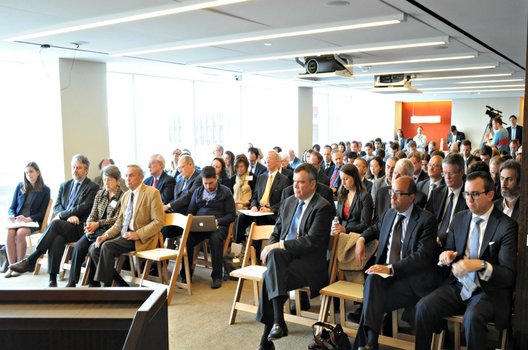
On May 23, the Atlantic Council Global Business & Economics Program in partnership with Baker & McKenzie hosted a conversation with the Honorable Daniel Fried, Coordinator for Sanctions Policy at the Department of State, Caroline Vicini, Deputy Head of the European Union(EU) Delegation to the US, and many leaders in the private sector. Additionally, an exclusive breakfast discussion was held.
Ambassador Fried discussed in frank conversation the grand strategy of U.S. sanctions towards Russia and the Minsk agreement. Ms. Vicini offered a European perspective, stressing the need for EU-US cooperation.
• The purpose of economic sanctions is to create the conditions for a solution to the Russian aggression in Ukraine, until they are no longer necessary.
• Sanctions are irretrievably linked to the Minsk agreement. So far, Russia has not fulfilled its Minsk obligations and thus, both US and EU sanctions will continue in the foreseeable future.
• The sanctions have proven to be useful tool both as a deterrent and as a way to force Russia to negotiate.
• US and EU sanction regimes are as closely aligned as possible, resulting from strong EU-US cooperation, which will be maintained moving forward.
• The sanctions were designed to avoid harming the general population while at the same time targeting political and economic elites responsible for Russian aggression.
• Management of the sanctions is complex as there are many layers of regulation, different agencies, and international actors involved.
• In the last year Russian exports declined 32%, while imports were down by 37%. While oil price fluctuations have played a role, sanctions have been a driving cause.
Image: Attendees listen carefully to Daniel Fried.
